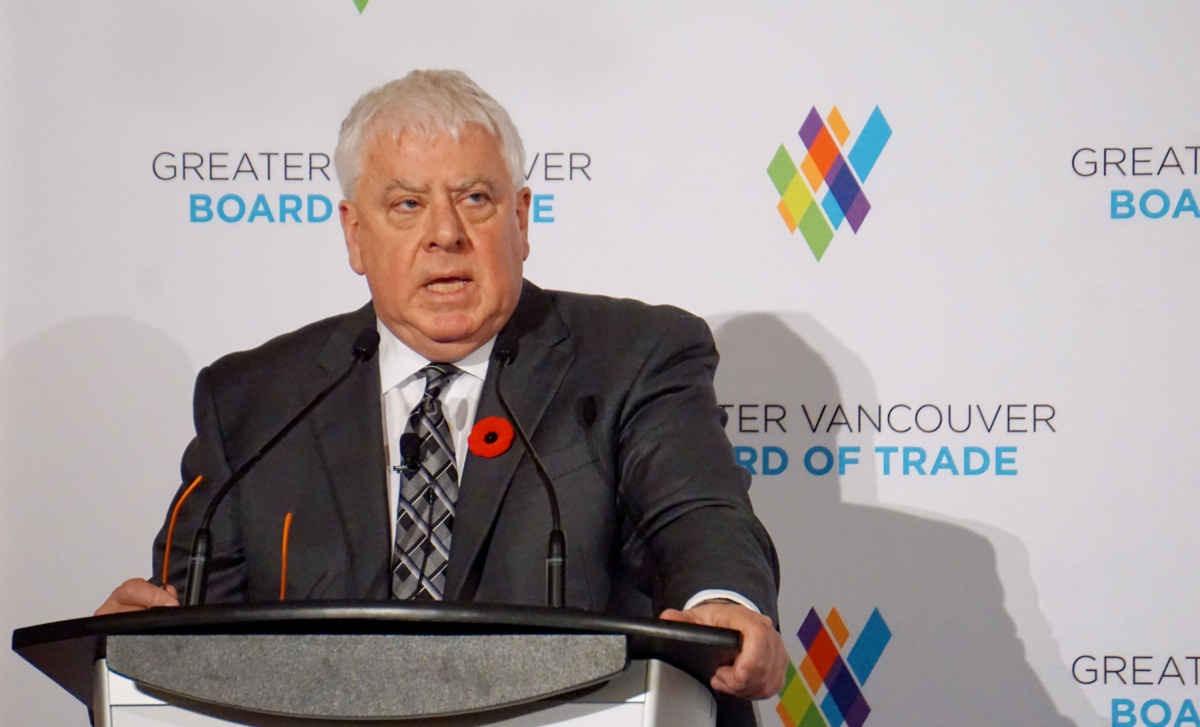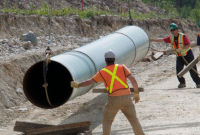Support strong Canadian climate journalism for 2025
Ottawa and Alberta are steaming over so-called pipeline “delays,” but documents filed with the National Energy Board (NEB) reveal their anger should be directed at Kinder Morgan itself, not the City of Burnaby or British Columbia. The Trudeau and Notley governments are in an uproar over what amounts to a missed deadline that was fabricated by the company.
Here’s what NEB filings actually show.
The NEB decided last December to exempt Kinder Morgan from Burnaby bylaws that require a Preliminary Plan Approval and a tree cutting permit for Trans Mountain's expansion. Burnaby and B.C. have decided to seek permission from the Federal Court to appeal.
The Board claimed that Burnaby’s “review time is the cause of, or a contributing or exacerbating factor to, Project construction delay, and the prejudice associated with that delay.”
Minister of Natural Resources Jim Carr says that Ottawa’s unequivocal support of Trans Mountain’s expansion is critical for there to be no further “unusual and unnecessary” delays to the project. This, he maintains, is why Ottawa supports a Standing Panel at the NEB requested by Kinder Morgan to expedite permit approvals for its project with minimum accountability and supervision.
Minister Carr echoes what the Board says — that the City of Burnaby is responsible for Trans Mountain’s new construction schedule and the cause of the project’s in-service date being pushed. Ottawa’s unbridled support of an NEB-run panel designed to usurp municipal and provincial authority is revolutionary. It is unprecedented action entrenching the needs of big oil over the legislative and regulatory rights of other jurisdictional bodies in Canada.
The NEB is a discredited regulator suffering from industry capture and steeped in controversy. When Bill C-69 passes, the Board will be abolished and all Board member positions terminated. Yet, Carr continues to rely heavily on the tainted regulator and parrots its determinations.
What if the NEB, either through incompetence or by design, is complicit in furthering a false narrative about the original construction schedule? What if there is no project delay — necessary or otherwise?
There is no delay
Well — there is no delay. Facts in NEB documents filed by Kinder Morgan show it is the company’s scheduling irregularities, not the City of Burnaby, that is responsible for changes to Trans Mountain’s in-service date. Facts tell us that Trans Mountain’s expansion could never have met a December 2019 in-service date, and Kinder Morgan knew it.
Kinder Morgan’s application was submitted to the NEB in December 2013. A construction schedule for the project was included with an in-service date of December 31, 2017. The company incorporated into this schedule the NEB mandated route hearing and certificate condition compliance process, which it expected, would begin by August 2015. In its original schedule Kinder Morgan also expected at least a nine-month time frame for NEB condition compliance and route hearing obligations because the company knows these activities take time.

Kinder Morgan revised its December 2013 construction schedule and filed it with the NEB in May 2017. There is no nine-month accommodation in the revised schedule for conditions compliance or the route hearing process — inexplicably these known obligations are missing. Ignoring the route hearing process is the reason Kinder Morgan was able to project a December 2019 in-service date for the project. (See Appendix A)
Kinder Morgan didn’t forget about the route hearings between the time its application was filed and when its revised schedule was prepared. Kinder Morgan explained to investors in May 2017 — the same month it filed its construction schedule with the NEB — that “detailed route hearings will be required where complaints arise. The NEB must approve the detailed route for the Trans Mountain Expansion Project before construction can commence.” (see page 28)
Investors were misled
It is not only the Canadian public that Kinder Morgan has misled by generating a construction schedule it knew to be unachievable, but its investors too. Investors were told that the project’s in-service date was December 2019, but Kinder Morgan did not advise them that it had failed to incorporate in that schedule an accommodation for an extensive route hearing process the company knew, at that time, it would be facing. The Board informed Kinder Morgan in early May 2017 that it had received 200 statements of complaint, each potentially triggering a hearing.
The route hearing process begins after Kinder Morgan files a Plan, Profile and Book of Reference (PPBoR). Kinder Morgan did so between February 17, 2017 and March 27, 2017. This means that construction on the pipeline — by Kinder Morgan’s original nine-month estimate — would be expected to commence in January 2018, at the earliest.
This is not all. There is another critical fact contained in NEB documents that Kinder Morgan was aware of, but failed to reasonably incorporate into its December 2019 in-service date schedule. Kinder Morgan failed to incorporate the impact the NEB’s definition of construction would have on its project schedule.
Logging and road building need approval
Kinder Morgan’s original construction schedule — the one filed in December 2013 — shows the company commencing pre-clearing, clearing and road access activities before satisfying certificate conditions and prior to route hearings being complete. Kinder Morgan assumed it could schedule seven months of clearing and access work to be undertaken concurrently with its route hearings’ timeline. When Kinder Morgan was granted its certificate, the Board’s definition of construction proved the assumption false.
The Board determined that clearing and road access is part of construction and must wait until construction permitting activity is complete.
The Board informed Kinder Morgan with plenty of time for Kinder Morgan to build this definition into its construction schedule. On May 3, 2016 — almost a year before Kinder Morgan filed its revised construction schedule — the Board told the company that construction is “any in-field activity that may have an effect on the environment and that is necessary for installing, deactivating, reactivating or decommissioning, or preparing to install, deactivate, reactivate or decommission, any component of the Project. Construction activities include, clearing, mowing, grading, trenching, drilling, boring, and blasting.” That means clearing and road access.
In its project application, Kinder Morgan specifically requested that the Board exempt the first 10 kilometres of each of the pipeline spreads from the route hearing process, but the Board refused. Almost two years ago, the Board determined that “Trans Mountain’s request for exemptions under subsection 58(1) of the NEB Act for the Clearing Activities is not granted.”
This means that Kinder Morgan knew it would not be permitted to schedule pre-clearing, clearing and road access activities concurrent with condition compliance and route hearings as it had done in its original construction schedule prepared in 2013. The company was directed to plan those activities after the Board’s permitting process was complete and commencement of construction had been approved.
We know Kinder Morgan did not take the Board’s definition of construction seriously. Kinder Morgan violated the terms of its certificate when it installed spawning deterrent mats in river beds last summer. The Board found that Kinder Morgan was out of compliance because the installation of the mats fell within the Board’s definition of construction while Kinder Morgan did not — and still does not — have permission to commence construction on the pipeline. Despite the clarity in the Board’s definition, Kinder Morgan maintains that it was unaware the installation of the mats constituted construction activity.
The practical implication of the Board’s definition of construction is that it adds months to Trans Mountain’s achievable construction timeline, but Kinder Morgan failed to reasonably reflect the definition of construction in its May 2017 construction schedule filing.
False project timeline
This second major Kinder Morgan scheduling failure further undermines the accuracy and reliability of its December 2019 in-service date estimate. Recognition of the route hearing process along with the Board’s definition of construction activities means a prudent and likely schedule has always been consistent with a mid-2018 construction start date and a December 2020 in-service date.
Kinder Morgan revised its project schedule again in November 2017. Time requirements for NEB certificate condition compliance and route hearings miraculously reappear. The November 2017 project schedule extends the in-service date to September 2020. By this time, however, Kinder Morgan had successfully marketed a false project timeline narrative to the ever-accommodating NEB, Ottawa, and the Canadian public.
Kinder Morgan’s start date was never possible
Kinder Morgan has convinced almost everyone that the reason for Trans Mountain’s revised in-service date was the City of Burnaby’s permitting process, not Kinder Morgan’s flawed scheduling practices. Facts tell us that regardless of Burnaby’s process, Trans Mountain’s December 2019 in-service date was never a possibility. The Board’s basis upon which it concluded Burnaby’s review time to be the cause of Trans Mountain’s construction delay is without merit. There is no delay. It was a set-up to demonize the City of Burnaby and set the stage for the NEB to usher in a permit expediting process exposing the Canadian economy and environment to more serious harm and loss than it already faces.
It wasn’t until January 17, 2018, that Kinder Morgan finally admitted that Trans Mountain’s expansion in-service date is December 2020. On February 1, 2018, the company filed a revised schedule with the NEB reflecting this. Inexplicably, current and ongoing conditions compliance and route hearing timelines are once again missing (See Attachment 2). There is mounting evidence to suggest that even a December 2020 in-service date is unlikely, not because of permitting but because of Kinder Morgan's management incompetence.
What is most troubling is the NEB’s complicity in Kinder Morgan’s scheduling chicanery. Minister Carr bought Kinder Morgan’s false narrative that the Board sold him. With the full weight of all the political capital he can muster, Minister Carr looks foolish rushing to Kinder Morgan’s defence.





Comments
One hopes that Minister Carr will now put a halt to the chicanery and cancel permits until such time as there is a reputable and independent review on the table.
Huge thanks for reporting on this.
Two issues: The Kinder Morgan pipeline must be stopped dead in its tracks. Secondly, the tar sands must be phased out. We must start a concerted effort toward renewable energy and as long as the tar sands exist this is forestalled.... https://canadianviews-ymo.ca/the-ndp-tentative-first-steps/
And this is just the beginning of false claims, including their ability to completely clean up spills. As a result the costs will climb. I hope Notley will be happy when she succeeds in polluting Vancouver harbour and the Strait of Juan de Fuca. Good going everyone, keep on ignoring the environment!
Yes. This is the kind of company we want running dilbit across B.C. watersheds, to the Vancouver harbour for the next 40 years. What could possibly go wrong, that some politician in Ottawa couldn't stand up in the house and blame on someone else.
We should never have allowed a couple of CEO's smart enough to leave Enron, just before that shitload of graft and incompetence hit the fan, to buy a Canadian pipeline company. But Canada just has to be open for business, doesn't it?
We get what we pay for...and we'll pay for what we get, if this pipeline goes through. The evidence is already documented that these are anything but straight shooters. And could someone explain, how you can clear cut....or construct 10 km of pipe...along a route that has not been finalized yet??